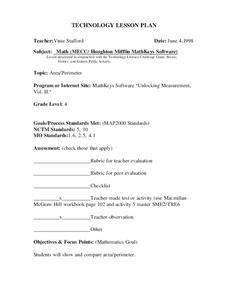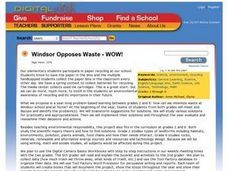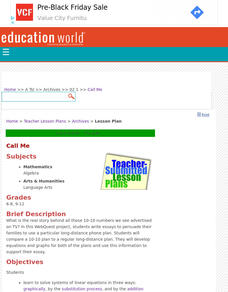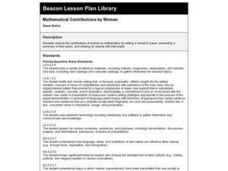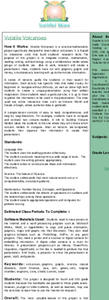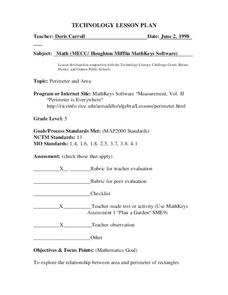Curated OER
Aerodynamics of a Boomerang
Students examine how aerodynamic forces affect the flight of aircraft, animals and sports balls and projectiles (like a javelin or boomerang). They discover the origins of the boomerang and early usage in hunting.
Curated OER
Motion Capture and Analysis
Students investigate the concepts and relationships of speed, displacement and time. They capture the serve motion of a tennis player via video or digital camera and analyze the speed of the ball and racquet head.
Curated OER
GPS Receiver Basics
Students practice using a GPS receiver. They walk in different directions and monitor their progress on maps. They enter specific locations and use information given to them to get them back to their original locations.
Curated OER
Patterns
Students explore the concept of linear patterns by moving into different body poses. They also use MathKeys software to create linear patterns across a computer screen. In groups of three they take turns adding to the pattern.
Curated OER
Ordering Objects By Length
Students compare and describe objects of differing lengths that are presented in a Mathkeys software compare mat. Working in pairs, one student is the chooser who sets up the objects while the other student is the sizer who puts the...
Curated OER
Goobers. Goobers? Goobers!
Students begin the activity by noting the many ways in which to use peanuts. In groups, they use the internet to research the work of George Washington Carver. They discover the allergies and nutritional information of the peanut and...
Curated OER
Making a Pictorial Timeline
Students create a pictorial timeline of a biographical character. In this timeline lesson, students create a slide show illustrating the life of the person from a biography they've read. Students also use Kid Pix to create a pictorial...
Curated OER
Passport to the Eastern Hemisphere
Seventh graders create a time line of significant dates in the history of their nation. This requires students to examine the entire history of a country and make informed judgments based on their historical knowledge.
Curated OER
Modeling Population Growth
Learners investigate the reasons for taking a census and determine the problems that are involved in the process. They examine the population figure for Montana and Lake county before using the information to complete the included...
Curated OER
Comparing Sizes And Shapes
Students compare, resize, and check various shapes by size using a comparison mat from the MathKeys program. Working in pairs, they place three similar shapes on the screen and state which is the largest and smallest in area. They also...
Curated OER
Area And Perimeter
Fourth graders investigate the concepts of area and perimeter, and they practice finding the values in various types of situations. They construct different representations of shapes using the area measurements and also explain the...
Curated OER
Properties of Lines - Parallel and Perpendicular
Sixth graders identify parallel and perpendicular lines in the alphabet. In this line properties lesson, 6th graders use the letters of the alphabet to show parallel and perpendicular lines. Students open a Geogrid Mat on the computer...
Curated OER
Windsor Opposes Waste - WOW!
Students participate in paper recycling. They are taught to environmental awareness of recycling and its importance in their future. Students discuss and identify the problems of how they can minimize waste. They brainstorm suggestions...
Alabama Learning Exchange
Is It a Triangle?
High schoolers explore the concept of triangle inequalities. In this triangle inequality lesson, students cut spaghetti noodles into given lengths. High schoolers use the noodles to complete a worksheet about triangle inequalities. ...
Alabama Learning Exchange
Trapezoids: What's Equal or Right About Them?
Pupils explore the concept of trapezoids. In this trapezoids instructional activity, young scholars identify legs and bases of a trapezoid. Pupils discuss the similarities and differences between isosceles trapezoids and right...
Curated OER
Tech Algebra: A Statistics Study
Students use the internet to gather a minimum of thirty pieces of data. Students create box and whisker graphs, and stem and leaf plots from the information. They calculate mean, median, mode, and range. Students write a summary and...
Curated OER
What's Your Angle
Students create an original lesson about geometry and angles. In small groups they take pictures using a digital camera of obtuse, acute, right, and straight angles that they find at school. Students use the photos in a computer...
Curated OER
Call Me
Students write essays to persuade their families to use a particular long-distance phone plan. They compare a 10-10 plan to a regular long-distance plan.
Curated OER
Mathematical Contributions By Women
Third graders explore the contributions of women to mathematics by writing a research paper, presenting a summary to their peers, and sharing an activity with their peers. They use a variety of reference materials to gather information...
Curated OER
Volatile Volcanoes
Students have fun with graphics, graphs and money, simultaneously learning with up-to-the-minute information.
Curated OER
Pictograph to Bar Graph
Second graders explore organizing data to make it useful for interpreting picture graphs and bar graphs. They use Graphers software to create a pictograph and a bar graph.
Curated OER
Phenomenal Weather-Related Statistics
Eighth graders research, collect and interpret data about weather statistics. They record that data on spreadsheets. they create Powerpoint presentations on their individual or group research.
Curated OER
Saving An Endangered Species
Second graders work in groups in order to look at specific internet sites for animal adoption and sponsorship. They select an endangered species, determine needed funds, develop, advertise, and carry out a fund-raising plan.
Curated OER
Perimeter and Area
Sixth graders explore the relationship between area and perimeter of rectangles. In this area and perimeter lesson, 6th graders measure and determine perimeter and area of various rectangles. Students create rectangles with given areas...












